Hiller Plumbing, Heating, Cooling & Electrical (Hiller), Tennessee’s largest provider of residential and commercial plumbing, HVAC, and Electrical service and repair, was honored with Ruud’s 2023 Top Pro Partner Award. This award marks Hiller’s ninth consecutive recognition, beginning in 2015. Since the 1800s, Ruud, a major manufacturer of HVAC systems, has been at the forefront Read more
heating
Hiller Plumbing, Heating, Cooling & Electrical Receives Ninth Consecutive Ruud Top Pro Partner Award
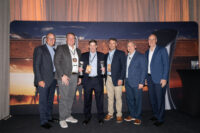
Hiller Plumbing, Heating, Cooling & Electrical (Hiller), Tennessee’s largest provider of residential and commercial plumbing, HVAC, and Electrical service and repair, was honored with Ruud’s 2023 Top Pro Partner Award. This award marks Hiller’s ninth consecutive recognition, beginning in 2015.
Since the 1800s, Ruud, a major manufacturer of HVAC systems, has been at the forefront of heating and cooling system development and innovation. Each year, Ruud evaluates contractors, naming Pro Partners that deliver the highest standards of excellence in installation and service of HVAC equipment. This designation is determined based on quality of work, verified customer feedback, and volume of exceptional installations and repairs.
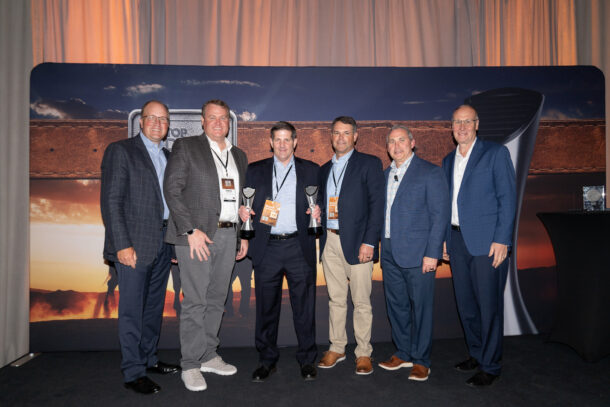
In 2015, Hiller received their first Pro Partner award, ranking first among 20 contractors selected from a pool of national businesses. Each year since, Hiller has been named among the best-of-the-best. The 2023 award, which was announced at a reception in Fort Worth, Texas, on April 30th, was Hiller’s ninth consecutive Pro Partner award.
“We are so proud to have been honored with our ninth Ruud Pro Partner Award this year”, remarked Jimmy Hiller, founder and CEO of Hiller Plumbing, Heating, Cooling & Electrical. “Like Hiller, Ruud is extremely committed to superior product installations, service, and maintenance. Their equipment helps us ensure that each family we serve is comfortable and happy in their homes for years to come. We are extremely honored”, he continued, “To have earned an award that recognizes our parallel commitment to superior installation and ongoing service and repair on these systems”.
Launched in 1990 with just $500 and a single truck, 24-year-old Jimmy Hiller founded his company on values that have become signatures of the Hiller brand: integrity, professionalism, exceptional ongoing training, truly caring for others, clear and upfront pricing, and 24/7 emergency services. Today, Hiller is one of the nation’s largest privately-owned home services companies, employing more than 800 associates with a fleet of over 600 “Happy Face” trucks across 17 locations in 7 states.

12 Schools to Receive Support to Create and Update Plumbing & HVAC Labs The “Explore The Trades Skills Lab, Built by Ferguson” equipment grants were announced on May 1, 2024, in celebration of National Skilled Trades Day. Twelve schools are the newest recipients of the Skills Lab equipment grants, which are projected to reach over Read more
12 Schools to Receive Support to Create and Update Plumbing & HVAC Labs
The “Explore The Trades Skills Lab, Built by Ferguson” equipment grants were announced on May 1, 2024, in celebration of National Skilled Trades Day.
Twelve schools are the newest recipients of the Skills Lab equipment grants, which are projected to reach over 1,000 students this upcoming school year. This dynamic program has experienced rapid growth since it began in 2021 and has now delivered plumbing and HVAC equipment to 26 schools and over 2,000 students nationwide.
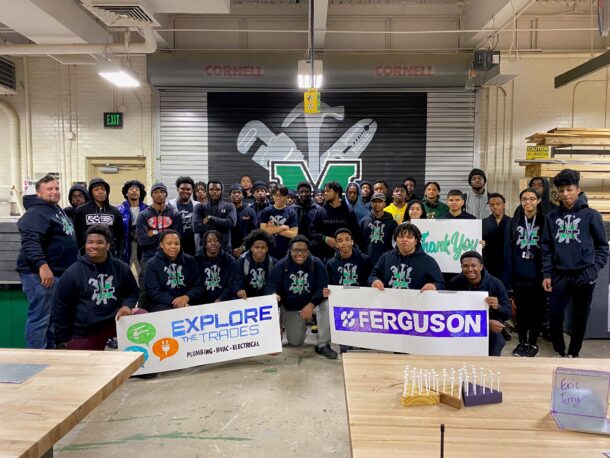
“The national conversation around the importance of the skilled trades and technical education has reached a fever pitch this year,” noted Kate Cinnamo, Executive Director of Explore The Trades. “Trade education programs in communities around the nation are bringing the next generation to these industries. Our partnership with Ferguson has given school districts the opportunity to build skilled trades labs that enable their students to thrive. It’s so encouraging to see students discover the trades, develop a passion for them and know that those skill sets will benefit them in careers after high school graduation.”
“We are proud to partner with Explore The Trades and thrilled to see our shared vision of building a sustainable skilled trades pipeline come to life,” commented Melissa Hazelwood, Director of Social Impact at Ferguson. “With the recent surge of interest in trades careers and the substantial investments in our country’s infrastructure, the need for skilled tradespeople has never bee more apparent. Through our concerted efforts, we are not just providing students with tools; we are laying the foundation for lifelong careers. Our partnership has already impacted thousands of students, and we are excited to continue this journey. We are committed to investing in the next generation.”
Congratulations to the following recipients!
- Appomattox County High School – HVAC (Virginia)
- Bemidji High School – HVAC (Minnesota)
- Callaway High School – HVAC (Georgia)
- Gateway Regional – HVAC (New Jersey)
- Ivy Academy – HVAC (Tennessee)
- Lebanon County Career and Technology Center – Plumbing (Pennsylvania)
- Mayfair Elementary and Middle School – Plumbing (Pennsylvania)
- Poplar Bluff Technical Career Center – HVAC (Missouri)
- Raymore-Peculiar Public School Foundation – HVAC (Missouri)
- Saginaw Career Complex – HVAC (Michigan)
- Thomas J. Corcoran High School – HVAC (New York)
- Woodruff Career and Technical Center – HVAC (Illinois)
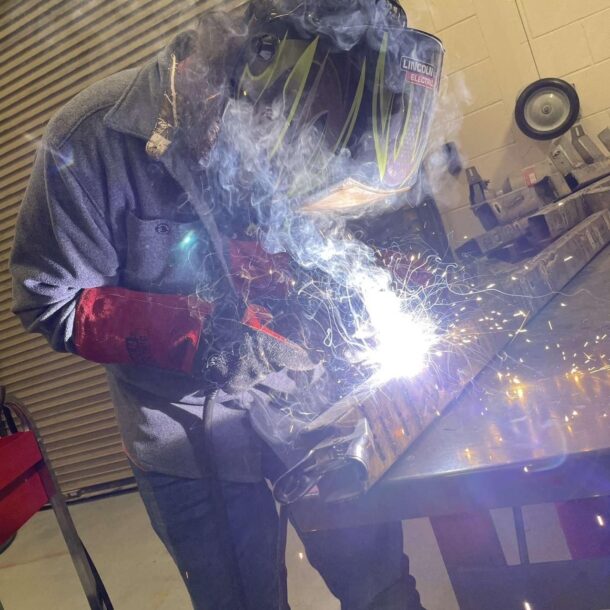
About Explore The Trades
Founded in 2005, Explore The Trades is committed to bridging the technical talent gap to the service trades of plumbing, heating, cooling, and electrical. The organization is focused on bringing the skilled trades conversation back into the classroom by providing classroom materials and on-demand resources for educators, parents, and students.

I wrote this “10 Tips ..” story in the early months of 2020, and we all know what happened after that, right? I thought it would be fun some four years later to amend the list accordingly. So here goes … … with the turn of every calendar year comes the rush of industry trade Read more
I wrote this “10 Tips ..” story in the early months of 2020, and we all know what happened after that, right? I thought it would be fun some four years later to amend the list accordingly. So here goes …
… with the turn of every calendar year comes the rush of industry trade shows. Next week we will be “traveling” to my hometown of Chicago for the AHR Show (January 22-24). Concurrently, during the same week, the WWETT show will be doing its thing in Indy (January 24-26). And if that wasn’t enough trade show hype for one week, the World of Concrete Show in Las Vegas is held, you guessed it, the same week (January 23-25).
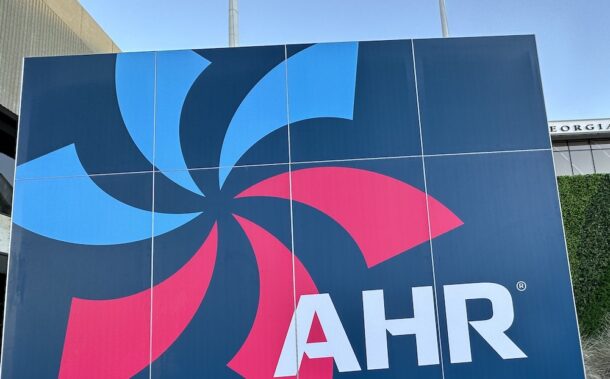
Following that, we will be in Las Vegas toward the end of February for the IBS/KBIS Show (February 27-29). All of these shows are worth the trip, depending your trade specialty, and what’s most important to you. Normally, I recommend all of these shows but this year is sort of an anomaly so the MH team had to pivot accordingly; I hope you have chosen so as well, my friends.
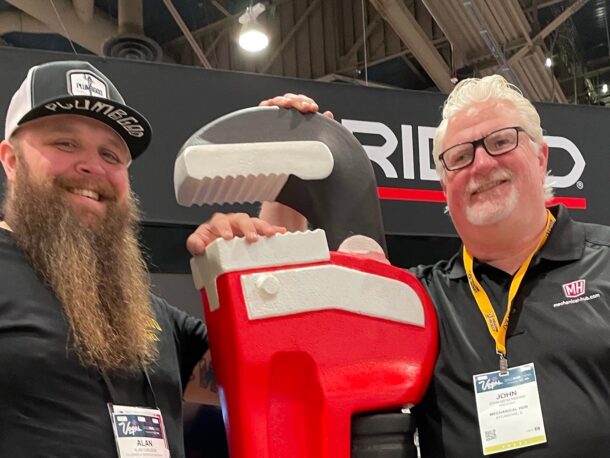
The purpose for those attending is to see, feel and test new products, learn and network with fellow attendees. Oh, did I mention hanging out with friends and this awesome community? When attending these trade shows it is best to have a plan. Having attended dozens of these show in the past, I have come up with some tips and strategies to having a successful show.
1. Map Out Your Plan — All of these shows have corresponding websites with a list of exhibitors and events. Map out your day so you are the most efficient with your time, energy and steps on the trade show floor. (ahrexpo.com & www.worldofconcrete.com & www.wwettshow.com & www.buildersshow.com) I can’t stress enough to download the appropriate trade show app and make a plan. It’s a must.
2. Wear Comfortable Shoes & Clothing — We all want to look good, and professional, but gone are the days of stuffy apparel. I’d rather feel comfortable and fresh at the end of the day than out of sorts, sweaty and my dogs barking.
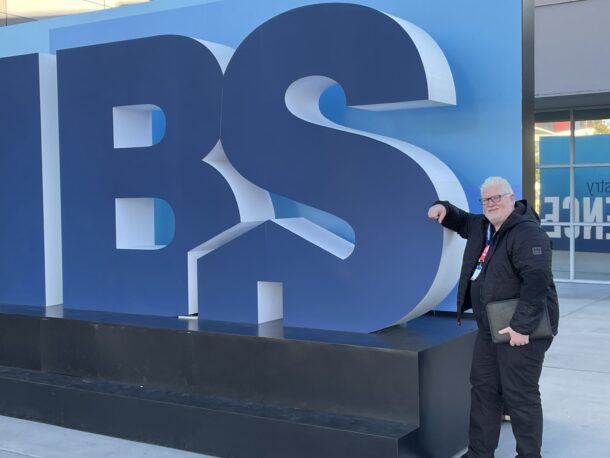
3. Give Yourself Enough Time — The stress of a trade show can be daunting in and of itself. Take as much time as you need to take a deep breath and move freely on the show floor. It’s always a good idea to come in the day or night before a show to make sure all is in order and registration for the show is set. If you are planning a night out, make sure you make any necessary reservations ahead of time.
4. Afterparty Over-Indulging — We all love to go out and enjoy ourselves, especially after a long day at a show. There are numerous manufacturer parties, dinners, soirees, etc. where one can relax and wind down. But staying out all night—and drinking—can be fun, and up to your discretion, but it isn’t advisable, especially if you intend to be at the show the following day. Nobody is impressed with the over-perspired, alcohol lingering on breath, bags under the eyes, headache pounding visit from on over-served attendee. Also, carry water and/or energy drinks and energy bars—or something to snack on—with you.
5. Plan Accordingly for Transportation — Most of the time at busy trade shows, transportation can, well, be a bitch, especially after a show. Keep this in mind as long taxi lines will form to and from the shows. Download your favorite rideshare app so you are locked and loaded.
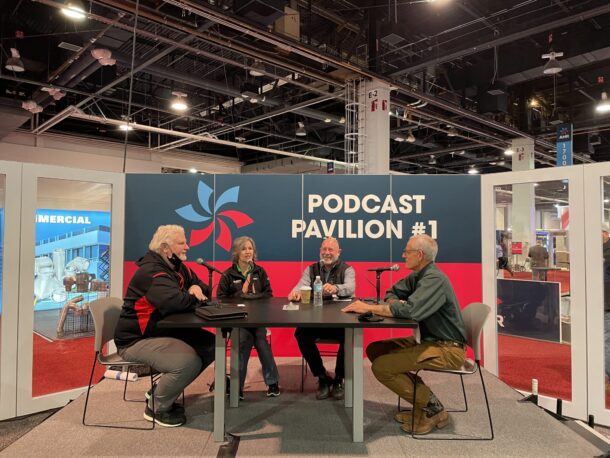
6. Visit the Podcast Pavilions — Everyone listens to podcasts, yes? Some of your favorite listens (Appetite for Construction & Make Trades Great Again, among others) will be recording “live” from the podcast pavilions located just in front of the North Hall to the right as your facing the entrance, behind registration and conveniently located by the beer garden. So grab a favorite beverage, relax and enjoy the p-casts!
7. Badges, We Don’t Need No Stinking’… — Well, make sure you have proper badges for the show. For example, attendee, exhibitor and press badges all provide different access and different access times. Make sure you understand the limitations of your particular given badge.
8. Follow-up with Contacts — Once the show is over, what it your end game? What better way to measure the results of a show personally than to document leads, follow up with new contacts, and were you satisfied with your expectations of information, contacts and overall impressions?
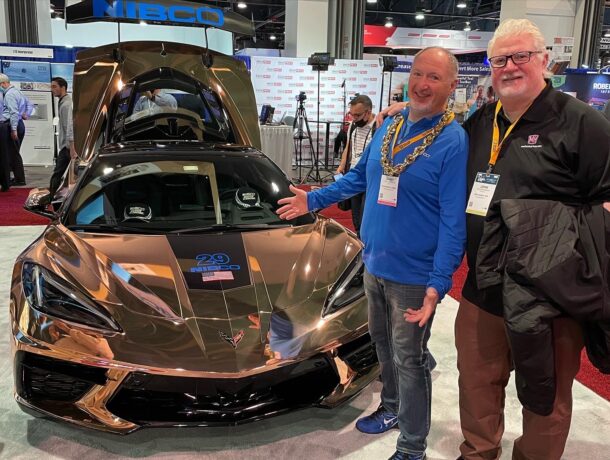
9. If Unable to Attend … — Be sure to follow your favorite social media outlets (@mechanicalhub & @plumbing_perspective for sure!) that may be attending and keep up to date on what’s going on from the show floor. First-of-the-year trade show events are when companies have big product announcements, launches and press briefings.
10. Cellular/WiFi Service — Most shows do not offer WiFi on the show floor, or if they do, it usually sucks. There are certain spots at different venues you may be able to sneak a signal, maybe. Make sure you have business cards on hand or be prepared to exchange info digitally through apps on your phone, so make sure your phone is charged or bring extra chargers!
Like deducing the age of a tree by counting its rings, I count age as it relates to how many AHR shows I have attended. I think I count 20 AHRs, 2021 notwithstanding. Good luck, have a great time, and have a great trade show experience!
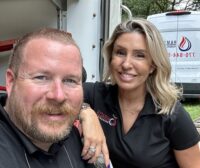
It’s that time of year again when people reflect on what they’re thankful for in the past year, and hope for a positive 2024. I cannot stress enough the job that Brent and Kathleen Ridley (@toolpros & @toolwife) do with Miracle Mechanical, a charitable organization dedicated to uplifting families in need, one at-no-cost-HVAC/plumbing repair at Read more
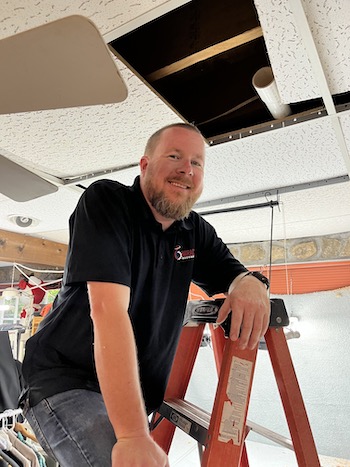 It’s that time of year again when people reflect on what they’re thankful for in the past year, and hope for a positive 2024. I cannot stress enough the job that Brent and Kathleen Ridley (@toolpros & @toolwife) do with Miracle Mechanical, a charitable organization dedicated to uplifting families in need, one at-no-cost-HVAC/plumbing repair at a time. “Honestly, it’s hard to put into words,” says Brent Ridley. “Seeing and feeling the gratitude from homeowners is an incredible feeling, and something that never gets old.”
It’s that time of year again when people reflect on what they’re thankful for in the past year, and hope for a positive 2024. I cannot stress enough the job that Brent and Kathleen Ridley (@toolpros & @toolwife) do with Miracle Mechanical, a charitable organization dedicated to uplifting families in need, one at-no-cost-HVAC/plumbing repair at a time. “Honestly, it’s hard to put into words,” says Brent Ridley. “Seeing and feeling the gratitude from homeowners is an incredible feeling, and something that never gets old.”
Tool Pros began as tool review brand, as the brand grew and relationships with tool manufacturers were made, Ridley felt a need to use his platform for more. “Free tools and trips are great but I thought to myself. ‘let’s actually do something that matters.’”
Combined with his platform and what he knew best—HVAC /plumbing—Miracle Mechanical was born. Shortly after the concept, Ridley reached out to his contacts at RIDGID to gauge interest. “Thankfully they loved the idea and wanted to sponsor the very first project. Two months later we completed our first project, and the rest is history,” says Ridley.
Officially, the primary facilitators of Miracle Mechanical consist of Brent and his wife Kathleen. They also bring in a production crew of three to four people, and their team of HVAC / plumbing contractors—usually a 4-man crew—for a project day.
Ridley says that the goal is always to complete as many projects as possible; however, they are averaging four to five projects per year. In fact, Miracle Mechanical just completed a project this past October with Sharkbite.
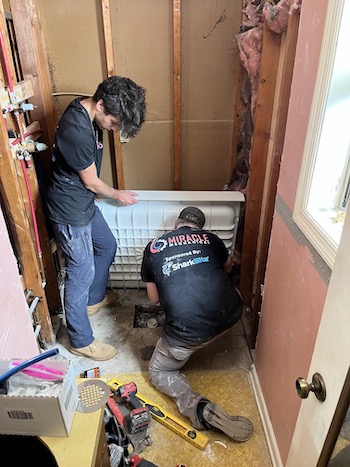 And they have partnered with RIDGID for the next project taking place in early 2024. In the past, Miracle has teamed up with the AHR Expo but nothing for 2024. “We look forward to partnering with AHR for their work force development program in the future,” says Ridley.
And they have partnered with RIDGID for the next project taking place in early 2024. In the past, Miracle has teamed up with the AHR Expo but nothing for 2024. “We look forward to partnering with AHR for their work force development program in the future,” says Ridley.
But between working as an HVAC contractor, content creator, Miracle Mechanical facilitator, podcaster and Lowe’s Santa, finding time to take a deep breath can be difficult. “Sure, it can feel overwhelming at times,” says Ridley. “Thankfully, I have my wife who is a full-time manager and coordinator for the Tool Pros brand and Miracle Mechanical. Her dedication to the brand allows me to focus on my HVAC/plumbing business (H & M Services, Inc.), as well as other creative outlets—without dropping any balls in the process.”
The Miracle Mechanical concept is such a good one, and one that I know Ridley hopes he can provide nationally. At this time, logistics and funding for national projects have been a huge obstacle, but one that I’m confident we’ll overcome in the next couple of years,” says Ridley.
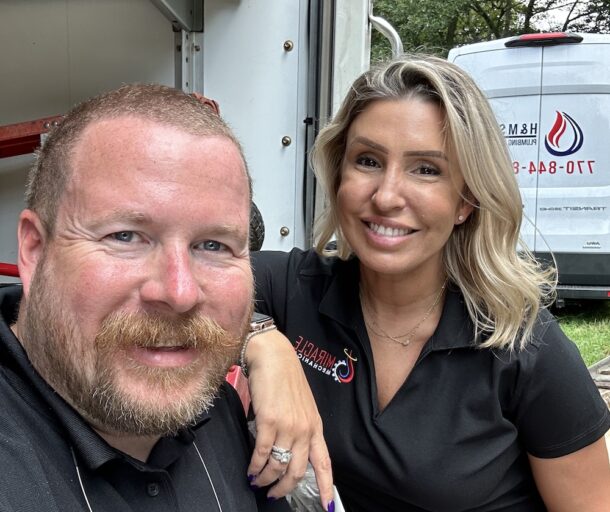
More About Brent Ridley
Ridley started into the trades right out high school in 2004. His girlfriend’s father, at the time, owned an HVAC business, and he started the summer after senior year doing commercial duct work and hated it. It was only until he found service and repair that he fell in love with the HVAC industry. “From there, I have always strived to make it more than just a ‘Job,’ but a lifestyle. If you want to get ahead in life, you can’t clock out at 5 pm.”
In the earier days before social media, Ridley wrote long-form, trade-specific tool reviews on a site called HVACTalk.com, which no longer exists. In 2017, Ridley started his successful Tool Pros Podcast. “Not long after, the social media portion of the brand quickly outgrew the podcast, leading to many opportunities that I am very grateful for, like Miracle Mechanical,” says Ridley.
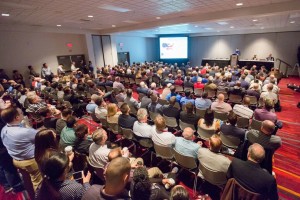
Professionals from the field provide insight and education on current practices and industry trends The AHR Expo (International Air-Conditioning, Heating, Refrigerating Exposition) has released the full schedule for the 2024 AHR Expo Education Program. This year’s program will feature more than 110 free seminars, a robust panel series lineup, new product and technology presentations, professional Read more
Professionals from the field provide insight and education on current practices and industry trends
The AHR Expo (International Air-Conditioning, Heating, Refrigerating Exposition) has released the full schedule for the 2024 AHR Expo Education Program. This year’s program will feature more than 110 free seminars, a robust panel series lineup, new product and technology presentations, professional certifications, and continuing education courses.
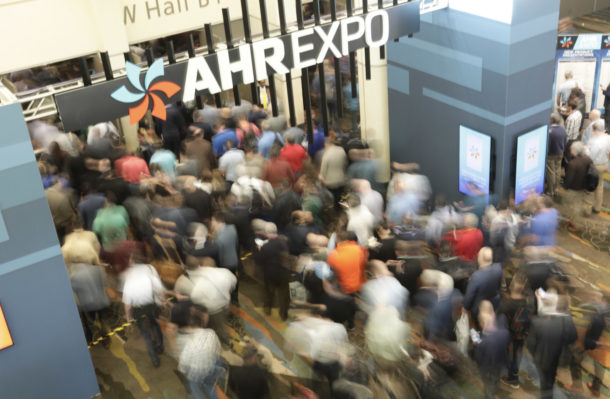
“The Education Program has grown into a true complementary asset to the show floor experience,” said Show Manager, Mark Stevens. “Inside exhibitor booths, manufacturers are displaying real solutions to improve the health of the industry, the professional work experience and to address the shifts in our wider society. As a bridge to the robust activity on the floor and attendee understanding, the education program will offer real discussions about real problems that are shared across the industry. We’re working to connect the varying sectors within our industry to deepen these conversations. By inviting our associations and community leaders to the table, we can spark important conversations that lead to smarter decision-making and customer engagement.”
The AHR Expo Education Program will provide an understanding of real-world application and practice in areas of niche discipline, as well as a broader discussion of topics relating to trends happening currently and on the horizon within the industry. Workforce education and open-form communication is an important factor as developments occur across the industry.
“Our manufacturers do a phenomenal job of displaying everything new to the market,” continued Stevens. “All the latest products and technologies, as well as solutions to nearly any issue attendees may encounter in their day-to-day professional HVACR efforts are there. The education program adds an added layer of understanding and knowledge building that supports what our manufacturers are bringing to market, and how professionals can work together to identify solutions throughout the full project cycle.” Attendees can expect the program to address a wide variety of topics and are encouraged to explore the full program on the website.
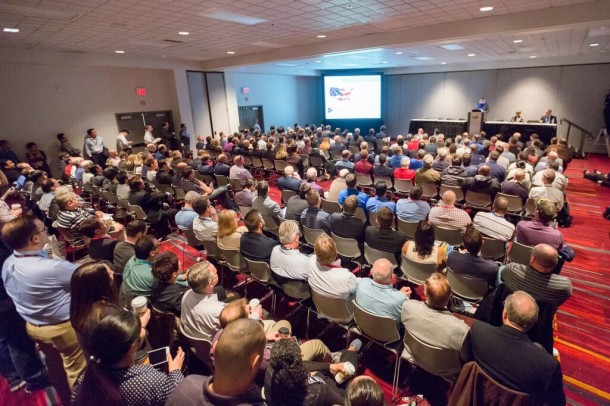
2024 AHR Expo Panel Series
2024 State of the Industry
In 2022, the AHR Expo launched a panel discussion among leaders representing every sector of the industry. As the first large event following the pandemic, the panel served as a recalibration of all that was happening across the industry as a result. The response was overwhelmingly positive and the benefit to the industry led to open communication throughout the remainder of the year. In 2024, Bryan Orr returns to moderate a state-of-the-industry update with leaders from ASHRAE, AHRI, HARDI, NCI, ASHB etc., regarding the current challenges, opportunities, and forecasts for the year ahead in HVACR.
Expected topics include changing regulations, the economic forecast including inflation and tariffs, the green transition, the supply chain, and more.
Speakers on this panel include Dominick Guarino, President & CEO of National Comfort Institute, Inc.; Ginger Scoggins, President, ASHRAE; Greg Walker, CEO of ASHB; Steve Yurek, CEO of AHRI; and Talbot Gee, CEO of HARDI. This panel will be moderated by Bryan Orr of HVAC School.
Heat Pumps, Electrification, and the Grid
This presentation will address how best to deploy heat pumps in retrofit projects while addressing two major barriers to electrification;
1. At the building level – how can we electrify w/o requiring costly upgrades to the building’s electrical infrastructure?
2. At the grid level – how do we electrify without stressing the grid by adding load in the peak utility demand periods?
Speakers on this panel include Mark Frankel, Chair of ASHRAE’s TFBD Heat Pump Working Group; Jon Heller, President at Ecotope, Inc.; Rand Conger, Johnson Barrow; and Sean Jarvie, Flow Environmental Systems.
AI, Controls and the Future of Technology in HVAC
This session will discuss the current and future roles of controls technology and artificial intelligence as they relate to HVAC and buildings management.
Speakers on this panel include Greg Walker, ASHB; Anto Budiardjo, CEO at Padi.io; Chad Langston, ABB; Charles Pelletier, Vice President, Product Management at Distech Controls; Darryl DeAngelis, Ebtron; and Stephen Holicky, Tridium/Honeywell.
Addressing the Workforce Talent Gap through Educational Partnerships
This session will discuss the impact collaboration with an educational institution can have on fostering a robust workforce. As we face an increasingly declining workforce, HVACR professionals can attune to provide supportive efforts to attract and maintain talent. The following topics will be discussed:
- Proven strategies to establish partnerships between education and industry that make a significant impact on improving HVACR, as well as hiring challenges, financial performance, and new hire retention
- How to find new talent that operations managers appreciate and are eager to hire
- How to build a culture that promotes technician retention and improves financial performance
- Understanding the types of partnership and how they make sense for your
organization - Realistic expectations and adaptability
- How and where to start as a professional or company
Speakers on this panel include Scott Shaw, President & CEO at Lincoln Tech; Alison Neuman, North American Workforce Development Program Manager at Johnson Controls; Brian Feilen, Lincoln Tech; Susan English, Senior Vice President of Career Services & Industry Partnerships at Lincoln Tech; and Jose De La Portilla, Senior Manager of Education and Training at Rheem Manufacturing.
Regional Updates: Refrigerants, Regulation and More
As an addition to the program this year, sessions highlighting trends, refrigerant and regulation updates specific to region, including but not limited to DOE, practices, equipment, as well as current and future projections in the region. Sessions in this series include:
- South/Southeast – Chris Forth, Vice President Regulatory, Codes & Environmental Affairs, Ducted Systems at Johnson Control
- Southwest – Jennifer Butsch, Director, Regulatory Affairs at Copeland
- North/Northeast – James “Jimmy” Abraham, Regulatory Affairs Manager at Bosch
FREE INDUSTRY SEMINARS
The 2024 show will feature more than 110 free sessions led by industry experts. Sessions will range from one to two hours and address some of the industry’s most pressing challenges and exciting opportunities. Attendees are invited to attend general HVACR-related sessions, as well as those specific to professional practice areas.
“The Education Programming is a means to learn trends, tips, and growth strategies for the professional and the business,” said Kimberly Pires, AHR Expo Education Program Director. “Our associations are in tune with what is current in their areas of the industry, and this program is the culmination of full industry learning. Our sessions aim to provide diverse perspectives from every professional and perspective in HVACR. The opportunity for shared insight supports healthy communication and growth within the industry.”
Attendees are encouraged to explore the full program on ahrexpo.com. Additional highlights for the 2024 AHR Expo Free Industry Seminar program include:
Contractors
- Contractor Marketing Do’s and Don’ts 2024
- A2Ls Are Here; What Happened to A3s?
- How Distributors, Contractors & Homeowners Can Prepare for Low-GWP Refrigerant Transition
- Price Increases, Inflation, the Economy… and What Your Customer Experience Can Do about It
Facility Managers/Owners
- Exploring HVACR’s Role in Facilities Management
- The Future of Home Services: How AI and Diagnostics Can Contribute to Business Success
- Key Performance Metrics for Energy and Facility Managers
Engineers
- Building Tomorrow’s Cooling Workforce: Navigating New Technologies and
Challenges - The Future of Home Services: How AI and Diagnostics Can Contribute to Business Success
- The Decarbonization Countdown: What’s in Store for Commercial HVAC Systems
- ACG Building Systems Commissioning Guideline Overview
General
- Navigating to a Greener Future: How Decarbonization and Innovation is Leading Our Markets
- What You Need to Know – A Closer Look at the Ongoing Implementation of the Inflation Reduction Act Incentives
- Redefining Comfort: Decarbonization’s Impact on the HVAC Industry
- How Distributors are Maintaining Profitability Despite Regulatory Headwinds
CONTINUING EDUCATION
AHR Expo attendees have the opportunity to participate in professional development courses through ASHRAE Learning Institute (ALI), as well as short courses/professional development seminars approved for Continuing Education Units (CEUs) that can apply toward maintaining P.E. licensure. Attendees are required to register and pay tuition fees in advance of the show and can do so either onsite or by visiting the ASHRAE registration website. Full-day courses account for six earned Professional Development Hours
(PDHs)/Learning Units (LUs) or 0.6 CEUs. All half-day courses are awarded three accredited PDHs/AIA LUs. Topics cover a wide range of industry subjects, including the fundamentals of the commissioning process, complying with the requirements of ASHRAE standards, laboratory design basics and beyond, optimizing indoor environments and more.
NEW PRODUCT THEATER PRESENTATIONS
Attendees are encouraged to sit in on exhibitor presentations in the New Product Theater. More than 145 presentations lasting approximately 20 minutes each are planned across all three days of the show. These free seminars will provide brief overviews of new product announcements and technologies that can be found in exhibitor booths on the show floor. Attendees are invited to follow up presentations with a visit to the booth for a more in-depth explanation and 1:1 interaction with products and representatives. These sessions are set to take place in special theaters right on the exhibit floor. No fee or registration is required.
This year, two 2024 Innovation Award winners will present, including:
Attendees can view the complete AHR Expo Education Program schedule, including the New Product Theaters, on the AHR Expo website. Additionally, attendees are encouraged to manage their show floor and education program agenda by creating a free MyShow Planner account and downloading the AHR Expo app.
The 2024 AHR Expo will be held Jan. 22 – Jan. 24 at McCormick Place in Chicago, IL. To register for the event, please visit the AHR Expo registration page.
